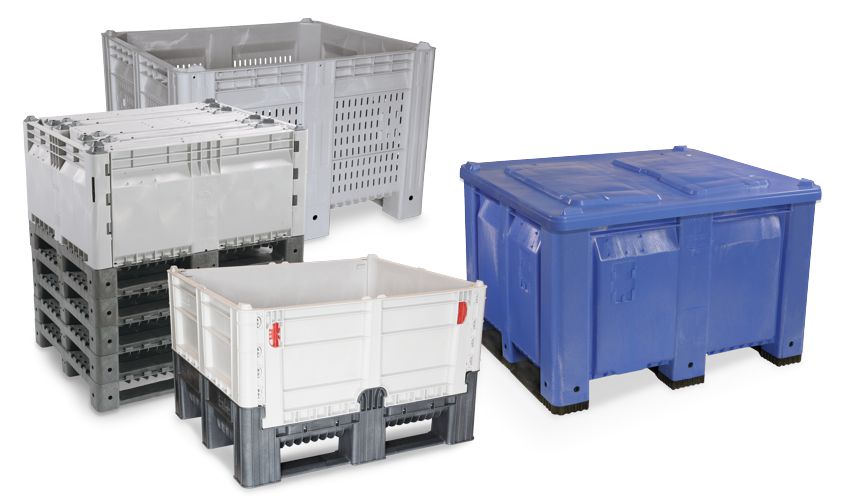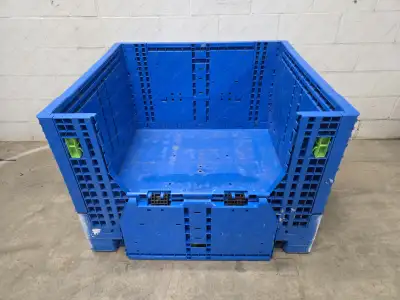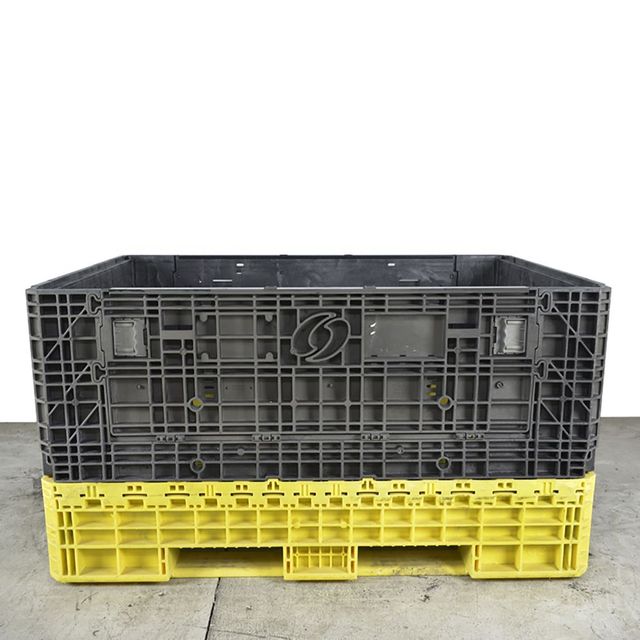Innovative Solutions: Uncovering the Versatility of Mass Containers in Various Industries
Mass containers have actually become a crucial development across multiple markets. Their design improves storage and transportation efficiency, dealing with varied needs while advertising sustainability. Services in farming, production, and logistics report significant renovations in operational procedures. The true degree of their impact might not yet be completely understood. Checking out the numerous applications and advantages of mass containers could reveal insights that improve industry criteria. What lies in advance for this developing service?
Enhancing Agricultural Performance With Bulk Containers
Exactly how can bulk containers change agricultural techniques? In the domain name of farming, bulk containers act as a pivotal advancement, improving effectiveness and sustainability. They make it possible for farmers to keep and carry big quantities of seeds, grains, and plant foods, minimizing the need for multiple smaller bundles that frequently add to squander. By making use of mass containers, farming procedures can optimize their supply chains, reducing managing expenses and time. These containers are made for very easy loading and discharging, allowing for speedy changes between different phases of farming procedures.
Bulk containers advertise far better supply administration, guaranteeing that producers have ample supplies on hand without extra. This performance equates to lowered labor prices and boosted efficiency. In an industry usually tested by varying need and seasonal variations, the reliability and scalability used by mass containers provide a substantial benefit, encouraging farmers to focus on quality and return.
Simplifying Manufacturing Processes With Mass Solutions
Bulk options play an important function in improving production processes by helping with effective material handling and offering cost-effective storage space alternatives. These containers help maintain a well organized production environment, ultimately boosting operations and efficiency. As industries significantly adopt bulk options, they are most likely to experience substantial enhancements in functional effectiveness.
Reliable Material Handling

Reliable product handling is essential for enhancing production procedures, as it directly influences performance and cost-effectiveness. Utilizing mass containers can substantially simplify procedures by streamlining the movement and storage of products. Their layout allows for easy loading and unloading, decreasing the time employees invest handling specific items. This efficiency not just reduces labor prices however additionally improves process, allowing producers to respond promptly to demand changes. In enhancement, bulk containers advertise far better company within facilities, facilitating quick access to products and minimizing downtime. By applying these flexible options, producers can improve total functional performance, ensuring that assembly line run smoothly and properly while decreasing waste and resource expense. Mass containers play a crucial function in boosting material handling methods.
Cost-efficient Storage Solutions
As manufacturers seek to optimize their operations, affordable storage options become progressively essential. Bulk containers provide a sensible ways of keeping huge amounts of materials, minimizing the demand for several smaller sized storage space systems. This debt consolidation leads to lower inventory prices, as bulk containers typically need less handling and cause reduced labor expenditures. Additionally, their standard sizes facilitate efficient stacking and storage, optimizing stockroom space. By utilizing mass containers, suppliers can minimize waste and enhance the general company of their facilities. These containers are additionally designed for sturdiness, which can minimize substitute costs in time. Generally, integrating bulk containers right into storage space strategies enables producers to improve operations while maintaining earnings and effectiveness in their supply chains.

Enhanced Manufacturing Process
The use of mass containers significantly improves manufacturing workflows by streamlining the management of materials throughout the production procedure. These containers assist in effective storage space and transportation, lowering the time invested in handling materials. Consequently, makers can attain quicker turn-around times and lessen hold-ups in manufacturing. Mass containers likewise advertise far better organization, allowing teams to quickly access raw materials when required, which even more simplifies procedures. In addition, the standardized dimension and form of these containers allow optimized use warehouse space, adding to overall efficiency. By incorporating mass options right into their procedures, companies can improve stock control and reduce waste, eventually bring about increased performance and a much more dexterous production setting.
Transforming Food Service Logistics
The food service sector is undergoing significant improvement with the fostering of mass containers, boosting storage abilities and enhancing area utilization. Reliable storage services enable organizations to handle inventory better, while streamlined transportation procedures minimize costs and improve shipment times. As an outcome, these advancements are reshaping logistics and driving higher efficiency across the industry.
Reliable Storage Space Solutions
Ingenious storage options are transforming food service logistics by improving performance and optimizing space usage. Mass containers, designed for optimum capacity, enable food solution suppliers to lessen squandered room while preserving easy access to products. These containers can be stacked and organized according to inventory requirements, improving the storage space procedure. Additionally, their resilience warranties that foodstuff remain risk-free and secure, reducing wasting and losses. With features such as modular designs and compatibility with numerous shelving systems, these containers can adapt to diverse kitchen designs. By using reliable storage space services, food service procedures not just boost process however additionally enhance overall productivity, assuring that resources are utilized successfully to satisfy client demands.
Structured Transport Processes
While numerous aspects add to the effectiveness of food service logistics, structured transportation procedures play an essential function in optimizing supply chain procedures. The fostering of mass containers substantially improves the activity of goods, permitting for quicker loading and dumping at circulation. Their standardized dimensions facilitate effective stacking and storage space, decreasing thrown away area during transit. Furthermore, mass containers lower the need for extreme packaging, bring about lower costs and reduced ecological effect. By making certain that items are safely delivered, they mitigate damage and spoilage, which is essential in the subject to spoiling food market. Generally, the assimilation of bulk containers into transportation strategies not just increases operational effectiveness yet likewise sustains lasting methods within the food solution market.
The Duty of Mass Containers in Pharmaceutical Supply Chains
In the pharmaceutical sector, bulk containers play a critical role in guaranteeing the reliable and risk-free transportation of resources and completed items. These containers are particularly designed to satisfy rigorous regulative needs, offering optimal defense against contamination and deterioration during transportation. Their durable building and construction permits the safe and secure transportation of delicate products, such as energetic pharmaceutical ingredients (APIs) and complex formulas, while lessening the danger of damages.
In addition, mass containers promote structured handling and storage procedures within stockrooms and manufacturing centers. Their standard sizes enable compatibility with automated systems, enhancing productivity and lowering labor costs. By using bulk containers, pharmaceutical firms can accomplish significant expense financial savings with mass investing in and minimized packaging waste.
Advertising Sustainability in Product Packaging Practices
The pharmaceutical market's increasing reliance on bulk containers has motivated a broader evaluation of sustainability in product packaging techniques across different industries. As companies seek to decrease their ecological effect, innovative strategies to packaging have gotten grip. Bulk containers, created for reuse and recycling, present a sensible option. Their resilience expands product lifecycles, lessening the need for single-use packaging.
Additionally, the shift towards environmentally friendly finishings and biodegradable products has actually become indispensable in the style of these containers. This adjustment not just addresses waste reduction yet additionally aligns with customer demand for sustainable products.
Industries such as food and cosmetics are taking on comparable approaches, acknowledging that lasting packaging can boost brand reputation. Joint initiatives between distributors and suppliers further advertise sustainability, motivating the advancement of closed-loop systems - refurbished bulk containers. Eventually, accepting sustainable packaging practices is necessary for cultivating a round economic climate and reducing the ecological impact across varied markets
Economical Transport Solutions With Bulk Containers

Mass containers simplify taking care of procedures, leading to lowered labor prices and reducing the risk of damages throughout transportation - refurbished bulk containers. Industries such as farming, chemicals, and pharmaceuticals gain from the toughness and toughness of these containers, which can withstand extreme problems while guaranteeing the integrity of their components
Additionally, the reusable nature of mass containers adds to lasting savings, as business can depend on less, much more resilient units as opposed to frequently replacing single-use product packaging. By doing this, bulk containers not just enhance efficiency but also sustain overall expense management in supply chain operations.
Personalization and Flexibility wholesale Container Style
While many bulk containers are created for conventional applications, their customization and versatility have ended up being important attributes for sectors with distinct demands. Makers now use a series of options, allowing customers to customize containers to specific dimensions, products, and performances. This adaptability enables companies to optimize storage space and transportation processes, making sure compatibility with different handling systems.
For instance, the food and pharmaceutical industries commonly require containers that meet rigid health and safety and security standards. Customized designs might incorporate attributes such as tamper-proof seals, easy-to-clean surface areas, and specialized ventilation systems. In the agricultural market, bulk containers can be tailored to click here help with the transportation of diverse products, from grains to fluids, enhancing functional effectiveness.
Eventually, the capability to customize mass containers not just improves efficiency but likewise sustains sustainability initiatives by decreasing waste and maximizing resource usage across multiple fields. This flexibility positions bulk containers as versatile solutions in today's vibrant market.
Regularly Asked Inquiries
What Products Are Bulk Containers Usually Made From?
Bulk containers are typically made from products such as high-density polyethylene (HDPE), steel, polypropylene, or aluminum. These products use longevity, resistance to chemicals, and the ability to securely keep and transfer numerous products across sectors.
Just How Are Bulk Containers Cleaned Between Uses?
Mass containers are commonly cleaned up using high-pressure washing, vapor cleaning, or chemical sanitization techniques (used plastic containers). The cleaning procedure assurances that deposits are gotten rid of, avoiding contamination and keeping the quality of components for succeeding uses

Can Bulk Containers Be Reused Several Times?
Yes, bulk containers can be recycled multiple times. Their durable layout enables repeated usage throughout various applications, supplied they are correctly cleaned up and preserved after each use to ensure safety and security and hygiene standards.
What Are the Weight Limits for Mass Containers?
Weight limitations for bulk containers usually range from 1,000 to 3,000 pounds, depending upon the product and design. Specs might differ by maker, so it is essential to consult guidelines for certain container kinds.
Exist Conventional Dimensions for Mass Containers?
Yes, there are common sizes for bulk containers, normally varying from 20 to 40 cubic feet. These measurements promote efficient storage space and transport throughout various industries, guaranteeing compatibility with devices and optimizing area utilization.
Using bulk containers can significantly enhance procedures by streamlining the activity and storage space of products. In enhancement, bulk containers promote much better organization within centers, helping with quick access to products and reducing downtime. Mass containers offer a sensible means of saving huge amounts of materials, reducing the need for multiple smaller storage space devices. The food solution sector is going through considerable transformation through the adoption of bulk containers, improving storage abilities and enhancing space use. Bulk containers facilitate structured handling and storage space operations within warehouses and manufacturing centers.